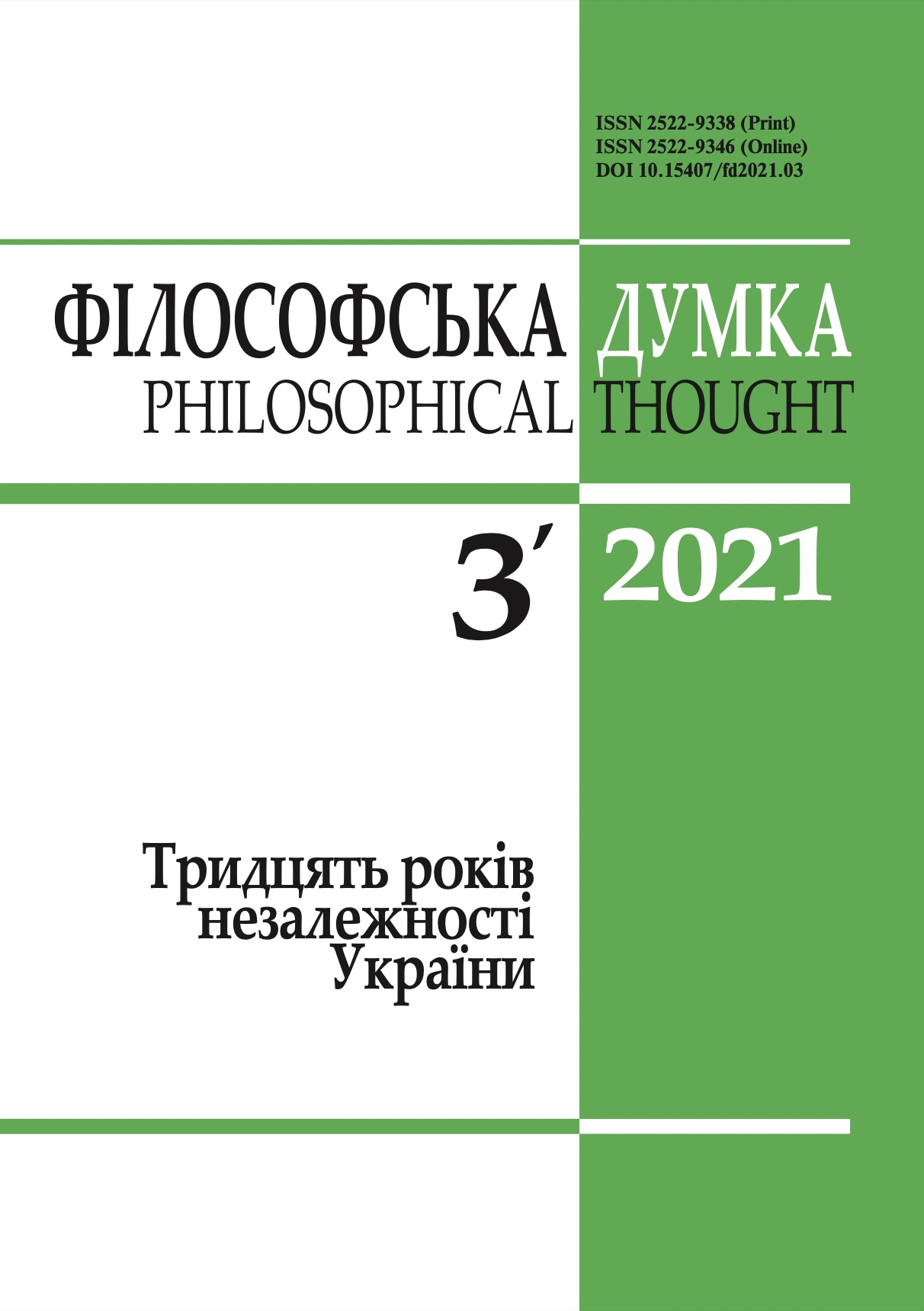ARTISTIC STRATEGY AND POLITICAL COMMUNICATION
POLITICAL PHILOSOPHY
DOI:
https://doi.org/10.15407/fd2021.03.108Keywords:
artistic strategy, political communication, rationality of illusion, public dialogue, technological refinement, mythological absorption, regime of truthAbstract
The main research narratives of the article are: the influence of artistic strategy on the political communication in the condition of post truth; political imagination and regime of post truth; art and regime of truth; rationality of illusions in the political communication; the techniques of artistic suggestion in public dialogue. It deals with the principle of reliability, the legitimacy rituals in the hunting for the voters. It is analyzed the mythological transformation, imitative mythology of the modern medias. It is discerned the technological integration of art in religion and politics, communication actions that make its “generic” feature and the “generic” burden at the same time. Such notions as poetry, art and technology are connected with the unfolding of the techno- logical refinement in all spheres of human activity. The author explains the need of the mythological distortion as the basis for the building of reality. It deals with the PR- technology transformation as the particular case of the cultural-political project into undeniable social value. It is defined the role of the artistic and political projects as the communicative prosthesis. Simultaneously the author traces the ouster of illusion in public communication. He analyzes the mo- dalities of the communicative practice and communicative experience reduction in the socialization process as well as the technological perfection in the mythological representation. The special features of the mythological absorption as the negation of law and social subject are determined here. It is also defined the sense of the law rationality regarding the rationality of myth.
References
Foukault, M. (2000). Subject and Power. Vol. 3. Power. NewYork.
Nietzsche, F. (2016). Die Geburt der Tragödie: oder Griechentum und Pessimismus. Berlin. Heidegger, M. (2000). Die Frage nach der Technik. Gesamtfusgabe. 1. Abteilung: Veröffentichte
Schriften 1910-1976. Bd. 7. Vorträge und Aufsätze. Frankfurt a,M:
Heidegger, M. (2007). On the Way to Language. [In Ukrainian]. Lviv.
Heidegger, M. (1991). Kant und Problem der Metaphysik. Frankfurt a.M.
Zizek, S. (2008). The Tiklish Subject: The Absent Centre of Political Onthology. [In Ukrainian]. Kyiv.
Hegel, G.W.F. (2004).(1959???) The Phenomenology of Spirit. [In Ukrainian]. Lviv.
Cassirer, E. (1946). The Myth of the State. New Haven.
Platonov, A. (1988). Chevengur:The Juvenile Sea. The Long Stories, the Novel. [In Russian]. Moscow.
Castoriadis, C. (1975). L'institution imaginaire de la societé. Paris.
Sloterdijk, P. (2002). Critique of Cynical Reason. [In Ukrainian]. Kyiv.
Hegel, G. W. F. (1969). Jenaer Systementwürfe III, Naturphilosophie und Philosophie des Geistes. Jenaer Realphilosophie. Berlin.
Habermas, J. (2000). Concerning the notion "public opinion" / Structurlal Transformations in the sphere of openness. [In Ukrainian]. Lviv.
Rorty, R. (1998). Rationality and Cultural Dіfference. Truth and Progress. Cambridge.
https://doi.org/10.1017/CBO9780511625404.011
Gadamer, H. G. (1990). Hermeneutik I. Wahrheite und Metod. Grundzüge einer philosophischen Hermeneutik. Tübingen.
Baudrillard, J. (1990). La Transparence du Mal. Paris.
Downloads
-
PDF (Українська)
Downloads: 238
Published
How to Cite
Issue
Section
License
Authors who publish with this journal agree to the following terms:
- Authors retain copyright and grant the journal right of first publication.
- Authors are able to enter into separate, additional contractual arrangements for the non-exclusive distribution of the journal's published version of the work (e.g., post it to an institutional repository or publish it in a book), with an acknowledgement of its initial publication in this journal.
- Authors are permitted and encouraged to post their work online (e.g., in institutional repositories or on their website) prior to and during the submission process, as it can lead to productive exchanges, as well as earlier and greater citation of published work (See The Effect of Open Access).


